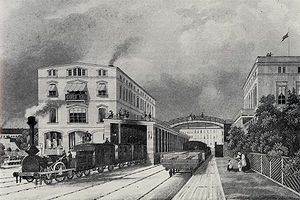Berlin Potsdamer Bahnhof
|
Berlin Potsdamer Bahnhof
|
|
|---|---|

The original Potsdamer Bahnhof around 1843, a few years after opening
|
|
| Location |
Mitte, Berlin, Berlin Germany |
| Line(s) |
Prussian Trunk Line (as of 1838) Wannsee Line (as of 1874) Anhalt Suburban Line (as of 1893) |
| History | |
| Opened | 29 October 1838 |
| Closed | 27 July 1946 |
| Rebuilt | 30 August 1872 |
| Electrified |
|
| Key dates | |
| 1945, February - August 6 | operation interrupted |
| 1957-1960 | ruined buildings removed |
The Potsdamer Bahnhof is a former railway terminus in Berlin, Germany. It was the first railway station in Berlin, opening in 1838. It was located at Potsdamer Platz, about 1 km south of the Brandenburg Gate, and kick-started the transformation of Potsdamer Platz from an area of quiet villas near the south-east corner of the Tiergarten park into the bustling focal point that it eventually became. For more than a century it was the terminus for long-distance and suburban trains. Also located at this spot were underground stations on the Berlin U-Bahn and S-Bahn, and today's new underground Regionalbahnhof, known as Bahnhof Potsdamer Platz, while the short-lived M-Bahn crossed the site of the former terminus.
The Potsdamer Bahnhof was the Berlin terminus of the city’s first railway, linking it with Potsdam. Begun in 1835, it was opened from the Potsdam end as far as Zehlendorf on 22 September 1838, and its entire length of 26 km on 29 October. The first train was hauled by a British-built locomotive, the work of Robert Stephenson at his Newcastle-upon-Tyne works in 1835, and called Adler (Eagle). In 1848 the lines were extended west to Magdeburg, to link up with routes extending across the future German state. The whole area around the Berlin terminus became a major focus for urban growth after its opening. Five major streets eventually converged here, most having started out as mere rough tracks through the Tiergarten park and adjoining fields.
The first Potsdamer Bahnhof lasted until 1869, when it was superseded by a far grander structure in response to growing traffic, built by Julius Ludwig Quassowski (1824–1909) with five platforms, a trainshed roof that was 173m long and 36m wide, a booking hall with separate waiting rooms and facilities for four classes of ticket holders, and a separate entrance and reception area on the west side for visiting royalty. Opened on 30 August 1872, it eventually handled train services to and from Cologne, Paris, Frankfurt/Main, Strasbourg and Aix en Provence. By 1890 over 3 million people a year were using it, and it was holding its own against a larger rival down the road (the Anhalter Bahnhof).
...
Wikipedia
